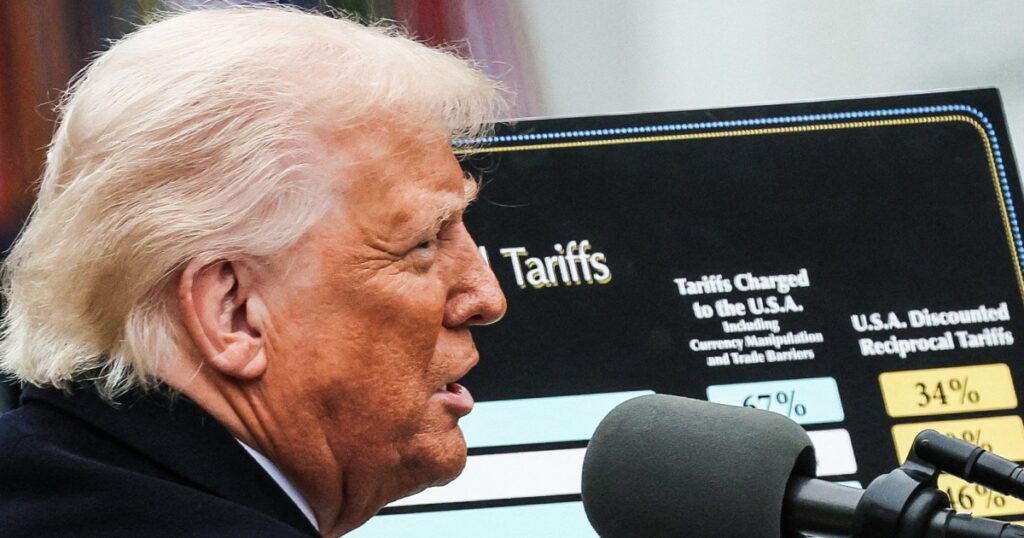WASHINGTON — Just a few weeks ago, President Donald Trump and White House aides were boasting that his tariffs would force a legion of foreign nations to rush into new trade deals — and that Trump’s prowess would yield more favorable terms for the U.S.
“I’m telling you, these countries are calling us up, kissing my a–,” Trump said last month before his reciprocal tariffs were due to go into effect. “They are dying to make a deal. ‘Please, please, sir, make a deal. I’ll do anything. I’ll do anything, sir!’”
Follow live politics coverage here
“We’ve got 90 deals in 90 days possibly pending here,” Trump trade adviser Peter Navarro said on NBC News’ “Meet the Press” a few days later — after Trump paused some of his tariffs and declared a three-month negotiating window.
But Trump has changed his tone and his tune in recent days, as it has become clear that trade agreements don’t materialize as quickly as he would like and that there aren’t dozens in the queue. His shift also comes amid heavy criticism that his tariffs will hike prices for consumers and harm an American economy that had its first negative growth in years in the first quarter.
“You keep writing about deals, deals. When are we going to sign one? It’s very simple. We’re going to say, in some cases, we want you to open up your country. In some cases we want you to drop your tariffs,” an obviously frustrated Trump told reporters Tuesday.
“So I wish they’d keep, you know, stop asking, ‘How many deals are you signing this week?’ Because one day we’ll come and we’ll give you 100 deals. And they don’t have to sign.”
It was Trump who set the 90-day clock.
Beyond the ambitious sweep of trying to haggle with scores of nations at once, the U.S. has yet to open discussions with its largest trading partner — China — since Trump applied a 145% across-the-board tariff on that nation’s products.
Treasury Secretary Scott Bessent told lawmakers Wednesday that his planned meeting with Chinese officials in Switzerland this weekend amounts to an early phase of negotiations that is not as far along as talks with less-crucial nations.
“On Saturday, we will begin, which I believe is the opposite of advanced,” Bessent said under questioning from Rep. Nydia Velázquez, D-N.Y.
The previous day he said that discussions are occurring with a far smaller number of countries than Trump and Navarro have counted and that the time horizon for agreements could be much longer.
“There are 18 very important trading relationships, and we are currently negotiating with 17 of those trading partners,” Bessent told the House Appropriations Subcommittee on Financial Services and General Government on Tuesday. “Approximately 97 or 98% of our trade deficit is with 15 countries, 18% of the countries are our major trading partners. And I would be surprised if we don’t have more than 80 or 90% of those wrapped up by the end of the year, and that may be much sooner.”
Bessent went on to say that there could be deals announced this week. And yet, the end-of-year timeline is far different from what White House officials had previously suggested. The change in rhetoric is intentional, according to one White House official who spoke on the condition of anonymity because they were not authorized to speak on the record.
The substance matters more than the speed, the official said.
“Obviously, we’re working as expeditiously as possible, but we’re not trying to make deals that are Band-Aids for the sake of making deals,” the official added.
Trump has used his authority under an emergency declaration to raise tariffs on U.S. trading partners — and he can lower them in similar fashion if and when he chooses — but he might have to involve Congress for more comprehensive trade agreements. For now, Trump is operating with one blunt-force tool — the levies applied to goods entering the U.S. from abroad — in order to win concessions on both duties and “nontariff barriers” to trade.
“We don’t need Congress to pass a bill” because the U.S.-applied tariffs should be enough to win those concessions, the White House official said. “The onus is obviously on the countries we’re negotiating with.”
On Wednesday night, Trump was ready to again talk about deals — now that, it seemed, he had something to tout.
He said that on Thursday morning, he posted on Truth Social, he would have an Oval Office press conference “concerning a MAJOR TRADE DEAL WITH REPRESENTATIVES OF A BIG, AND HIGHLY RESPECTED, COUNTRY. THE FIRST OF MANY!!!”

